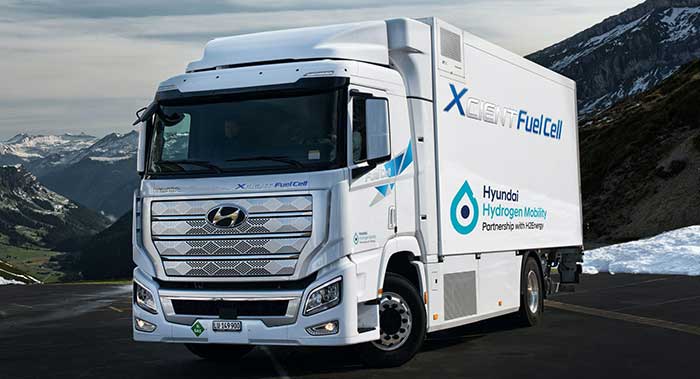
In a significant step toward sustainable transportation, Hyundai has unveiled its hydrogen fuel cell electric truck in Australia, with trials set to begin in 2025. The initiative marks a pivotal moment for the country’s heavy vehicle sector, showcasing Hyundai’s commitment to zero-emission commercial transport. The hydrogen-powered truck, part of Hyundai’s XCIENT Fuel Cell lineup, represents a cutting-edge alternative to traditional diesel vehicles, offering long-range capabilities and quick refueling without harmful emissions.
Australia’s vast geography and reliance on freight transport make it an ideal testing ground for hydrogen fuel cell technology. Unlike battery-electric trucks, which require lengthy charging times, hydrogen-powered vehicles can be refueled in minutes, providing a practical solution for long-haul logistics. Hyundai’s decision to introduce the XCIENT Fuel Cell truck in Australia aligns with the country’s growing interest in hydrogen as a clean energy source. The Australian government has been actively supporting hydrogen projects through funding and policy initiatives, recognizing its potential to decarbonize industries such as mining, shipping, and road transport.
The Hyundai XCIENT Fuel Cell truck boasts a range of approximately 400 kilometers on a single hydrogen fill, making it suitable for regional freight operations. Its powertrain consists of a 180-kilowatt hydrogen fuel cell system paired with a 350-kilowatt electric motor, delivering performance comparable to conventional diesel trucks. Additionally, the only byproduct of its operation is water vapor, eliminating carbon dioxide and other pollutants associated with fossil fuel combustion.
Hyundai’s Australian trials will focus on real-world performance, including durability, efficiency, and refueling infrastructure. The company has partnered with local logistics firms and hydrogen suppliers to ensure seamless integration into existing transport networks. One of the key challenges for hydrogen adoption has been the lack of refueling stations, but Hyundai’s collaboration with Australian energy companies aims to address this gap. Several hydrogen production hubs are already under development across the country, leveraging Australia’s abundant renewable energy resources to produce green hydrogen through electrolysis.
The introduction of Hyundai’s hydrogen truck comes at a time when global interest in fuel cell technology is accelerating. While battery-electric vehicles dominate the passenger car market, hydrogen is increasingly seen as the better option for heavy-duty applications due to its superior energy density and faster refueling. Countries like South Korea, Germany, and Japan have already embraced hydrogen-powered trucks for commercial use, and Hyundai’s Australian trials could pave the way for broader adoption in the Asia-Pacific region.
Experts believe that hydrogen fuel cell trucks could play a crucial role in reducing greenhouse gas emissions from the transport sector, which accounts for a significant portion of global CO₂ output. For Australia, where mining and agriculture depend heavily on diesel-powered trucks, transitioning to hydrogen could drastically cut emissions while maintaining operational efficiency. Hyundai’s initiative also supports Australia’s National Hydrogen Strategy, which aims to position the country as a leading exporter of hydrogen by 2030.
Despite the promise of hydrogen fuel cell technology, challenges remain. The cost of producing green hydrogen is still high compared to fossil fuels, and building a widespread refueling network requires substantial investment. However, advancements in electrolysis technology and increasing government support are expected to drive costs down in the coming years. Hyundai’s trials will provide valuable data on the economic viability of hydrogen trucks in Australia, helping stakeholders make informed decisions about future investments.
Hyundai’s move also signals a broader shift in the automotive industry, where major manufacturers are diversifying their zero-emission strategies. While Tesla and other companies focus on battery-electric trucks, Hyundai is betting on hydrogen as a complementary solution for long-distance and heavy-load transport. The XCIENT Fuel Cell truck has already seen successful deployments in Europe and North America, with fleets accumulating millions of kilometers in real-world use. The Australian trials will further validate its performance in harsh climates and demanding terrains, reinforcing Hyundai’s position as a leader in hydrogen mobility.
As the world transitions toward cleaner energy, hydrogen fuel cell technology offers a compelling alternative for industries that are difficult to electrify. Hyundai’s Australian trials represent a critical step in proving the feasibility of hydrogen-powered freight transport, potentially unlocking new opportunities for sustainable logistics. If successful, the initiative could accelerate the adoption of hydrogen trucks across Australia and beyond, contributing to global efforts to combat climate change.
In conclusion, Hyundai’s debut of its hydrogen fuel cell truck in Australia marks a significant milestone in the evolution of green transportation. By demonstrating the practicality and environmental benefits of hydrogen-powered heavy vehicles, Hyundai is helping to shape the future of freight transport. The 2025 trials will be closely watched by industry leaders, policymakers, and environmental advocates, as they could determine the role of hydrogen in achieving a carbon-neutral transport sector. With continued innovation and collaboration, hydrogen fuel cell technology may soon become a cornerstone of Australia’s clean energy economy.

